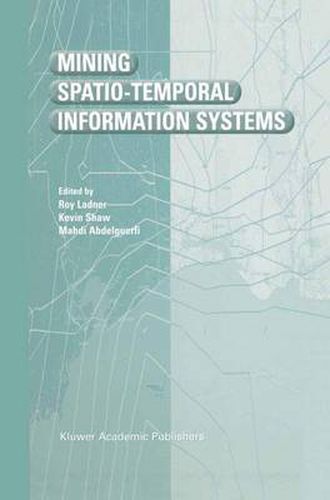Readings Newsletter
Become a Readings Member to make your shopping experience even easier.
Sign in or sign up for free!
You’re not far away from qualifying for FREE standard shipping within Australia
You’ve qualified for FREE standard shipping within Australia
The cart is loading…






This title is printed to order. This book may have been self-published. If so, we cannot guarantee the quality of the content. In the main most books will have gone through the editing process however some may not. We therefore suggest that you be aware of this before ordering this book. If in doubt check either the author or publisher’s details as we are unable to accept any returns unless they are faulty. Please contact us if you have any questions.
We are facing a rapidly growing capability to collect more and more data regarding our environment. With that, we must have the ability to extract more insightful knowledge about the environmental processes at work on the earth. Spatio-temporal information systems (STIS) should prove beneficial in producing useful knowledge about changes in our world from these ever-burgeoning collections of environment data. STIS provide the ability to store, analyze and represent the dynamic properties of the environment, that is, geographic information in space and time. A STIS, for example, can produce a weather map, but more importantly, it can present a user with information in map or report form indicating how precipitation progresses in space over time to affect a watershed. Other uses include forestry and even electrical systems management. Forestry experts using an STIS are able to examine the rates of movements of forest fires, how they evolve over time, and their impact on forest growth over long periods of time. A large electrical network system manager uses an STIS to track the failures and repairs of electrical transformers. Use of an STIS in this case allows the reconstruction of the status of the network at any given past time. This title is an edited volume is composed of chapters from experts in the field and addresses the many issues in support of modelling, creation, querying, visualizing and mining. The book is intended to bring together a coherent body of knowledge relating to STIS data modelling, design, implementation and STIS in knowledge discovery. In particular, the reader is exposed to the most up-to-date techniques for the practical design of STIS, essential for complex query processing. It is structured to meet the needs of practitioners and researchers in industry and graduate-level students in computer science.
$9.00 standard shipping within Australia
FREE standard shipping within Australia for orders over $100.00
Express & International shipping calculated at checkout
Stock availability can be subject to change without notice. We recommend calling the shop or contacting our online team to check availability of low stock items. Please see our Shopping Online page for more details.
This title is printed to order. This book may have been self-published. If so, we cannot guarantee the quality of the content. In the main most books will have gone through the editing process however some may not. We therefore suggest that you be aware of this before ordering this book. If in doubt check either the author or publisher’s details as we are unable to accept any returns unless they are faulty. Please contact us if you have any questions.
We are facing a rapidly growing capability to collect more and more data regarding our environment. With that, we must have the ability to extract more insightful knowledge about the environmental processes at work on the earth. Spatio-temporal information systems (STIS) should prove beneficial in producing useful knowledge about changes in our world from these ever-burgeoning collections of environment data. STIS provide the ability to store, analyze and represent the dynamic properties of the environment, that is, geographic information in space and time. A STIS, for example, can produce a weather map, but more importantly, it can present a user with information in map or report form indicating how precipitation progresses in space over time to affect a watershed. Other uses include forestry and even electrical systems management. Forestry experts using an STIS are able to examine the rates of movements of forest fires, how they evolve over time, and their impact on forest growth over long periods of time. A large electrical network system manager uses an STIS to track the failures and repairs of electrical transformers. Use of an STIS in this case allows the reconstruction of the status of the network at any given past time. This title is an edited volume is composed of chapters from experts in the field and addresses the many issues in support of modelling, creation, querying, visualizing and mining. The book is intended to bring together a coherent body of knowledge relating to STIS data modelling, design, implementation and STIS in knowledge discovery. In particular, the reader is exposed to the most up-to-date techniques for the practical design of STIS, essential for complex query processing. It is structured to meet the needs of practitioners and researchers in industry and graduate-level students in computer science.